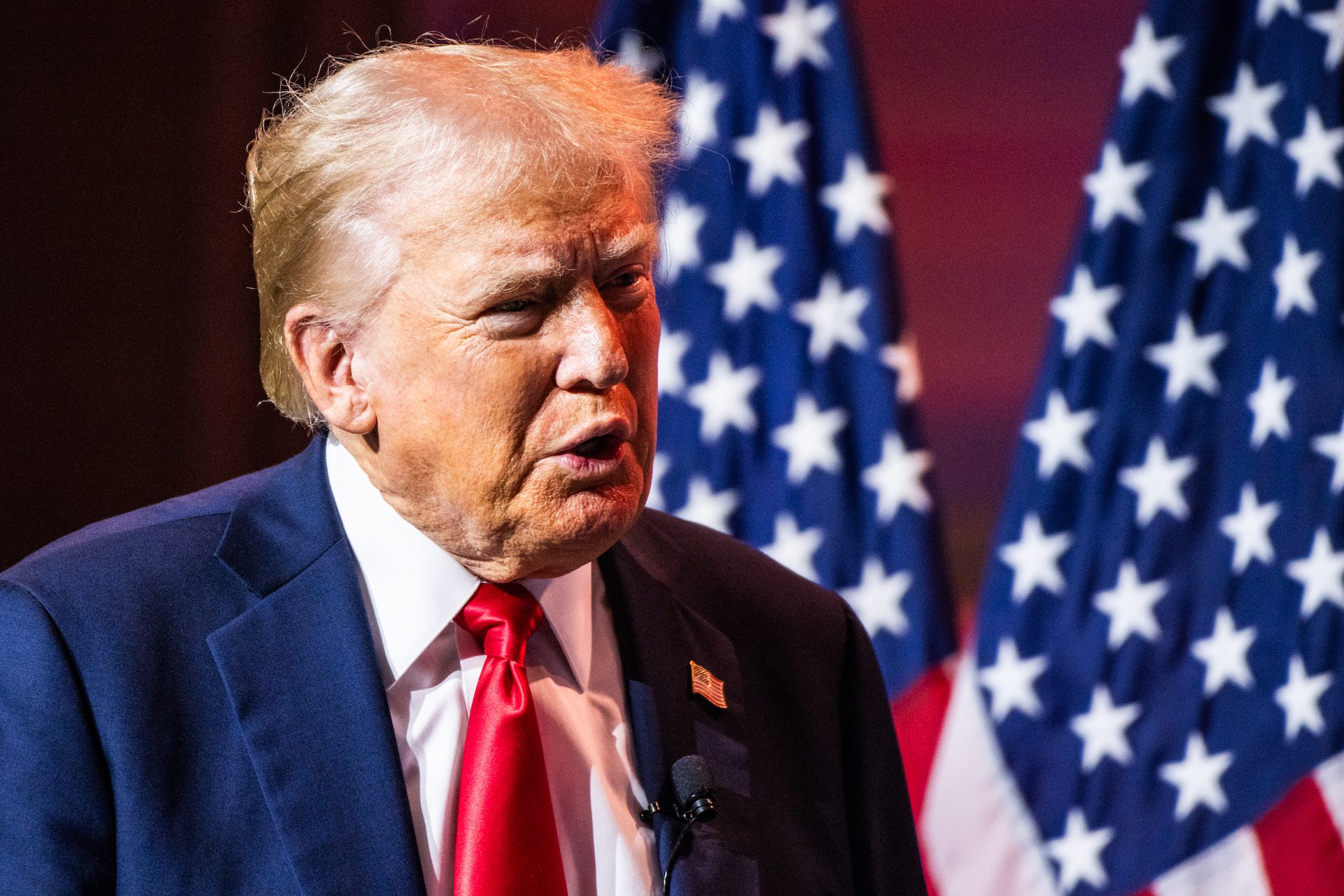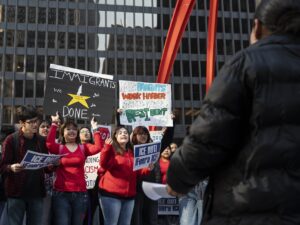 Colin Boyle/Block Club Chicago
Colin Boyle/Block Club ChicagoPresident Donald Trump’s second term, environmental policy and more stories we will follow in the new year.
For much of the last year, the presidential election dominated headlines. Immigration and false information about new arrivals and immigrant communities remained a focal point throughout the campaign. Chicago played a pivotal role in the election by hosting the Democratic National Convention even as city officials navigated criticisms of migrant shelter conditions.
Borderless Magazine covered these stories and how immigrant communities navigated immigration court without attorneys, migrant shelter challenges and more. As we start the new year, here are some stories we’ll watch closely in 2025. Your questions, observations, and experiences are critical to our work. Share them with us on social media or by email at [email protected].
Donald Trump’s Asylum and Travel Restrictions
President-elect Donald Trump defeated Vice President Kamala Harris in a contentious presidential election. For his second term, Trump vows to reinstate his Muslim travel ban, which barred immigrants from six Muslim-majority countries from entering the United States in 2017.
News that puts power under the spotlight and communities at the center.
Sign up for our free newsletter and get updates twice a week.
Trump has also promised more significant restrictions for asylum seekers. He plans to reinstate Title 42, a policy that he previously utilized during the COVID-19 pandemic to turn away and deny asylum seekers from entering through the U.S.-Mexico border. He looks to reinstitute the Migrant Protection Protocols (MPP), also known as his ‘Remain in Mexico’ policy, which required asylum seekers to wait in Mexico — oftentimes in dangerous conditions — during their immigration court proceedings.
Mass Deportation Threats
Last month, Tom Homan, the former acting director of U.S. Immigration and Customs Enforcement — and Trump’s handpicked border czar threatened to start mass deportations in Chicago. The threat falls in line with Trump’s campaign rhetoric, where he promised to enact sweeping deportations of people who have entered the country without authorization. He pledged to invoke the Alien Enemies Act of 1798 to pursue ‘Operation Aurora,’ an effort that would deport immigrants with criminal convictions and without permanent legal status.
The Alien Enemies Act has only been used three other times in U.S. history — during the War of 1812, World War I, and World War II. The centuries-old law allows a president to detain, relocate or deport noncitizens from a country considered an ‘enemy’ of the U.S. during wartime. Trump has promised to use the U.S. military to carry out mass deportations, an action that would likely face legal hurdles and logistical challenges.
DACA’s Uncertain Future
The future of former President Barack Obama’s Deferred Action for Childhood Arrivals (DACA) program remains unclear. During his first term, Trump made multiple attempts to end the program, which protects immigrants lacking permanent legal status who were brought to the U.S. as children, also known as DREAMers. The incoming president recently stated he wants to “work something out” with Democrats on the future of the country’s DREAMers. Meanwhile, the Supreme Court could decide the legality of DACA this year.
Read More of Our Coverage
Trump’s Environmental Policy
Illinois faces the threat of more frequent flooding and extreme heat days exacerbated by climate change. Chicago also has some of the worst air pollution in the country, concentrated in Black and Brown neighborhoods on the South and West sides due to heavy-duty truck traffic from nearby warehouses and manufacturing facilities.
Trump will inherit hundreds of billions of dollars in programs from the 2022 Inflation Reduction Act (IRA) and the 2021 Bipartisan Infrastructure Law currently being rolled out. Hundreds of millions of dollars are already flowing into Illinois to address environmental concerns, but such initiatives could face obstacles from an administration that has called climate change a hoax.
Trump’s conservative allies authored Project 2025, a wish list of actions proposed by the Heritage Foundation for the next Republican president. The document calls for eliminating the Environmental Justice and Civil Rights Office, reviewing the EPA’s grants program, and “using enforcement to ensure compliance, not to achieve extrastatutory objectives.”
How Chicago Will Respond to Trump’s Threats
As Chicago and Illinois leaders navigate a second Trump presidency, Borderless will evaluate how federal policies will impact the city’s Welcoming City ordinance. Under the law, the Chicago Police Department does not ask about immigration status or disclose immigration information to federal officials.
In 2021, then-Mayor Lori Lightfoot strengthened the law to stop police from cooperating with federal agencies like Immigration and Customs Enforcement in all cases, including for those with criminal charges or convictions. Still, Trump’s administration and his cabinet have promised to target Chicago and other sanctuary cities with deportations and other immigration enforcement. Borderless will watch how the city and immigrant-serving groups respond to such enforcement plans.


